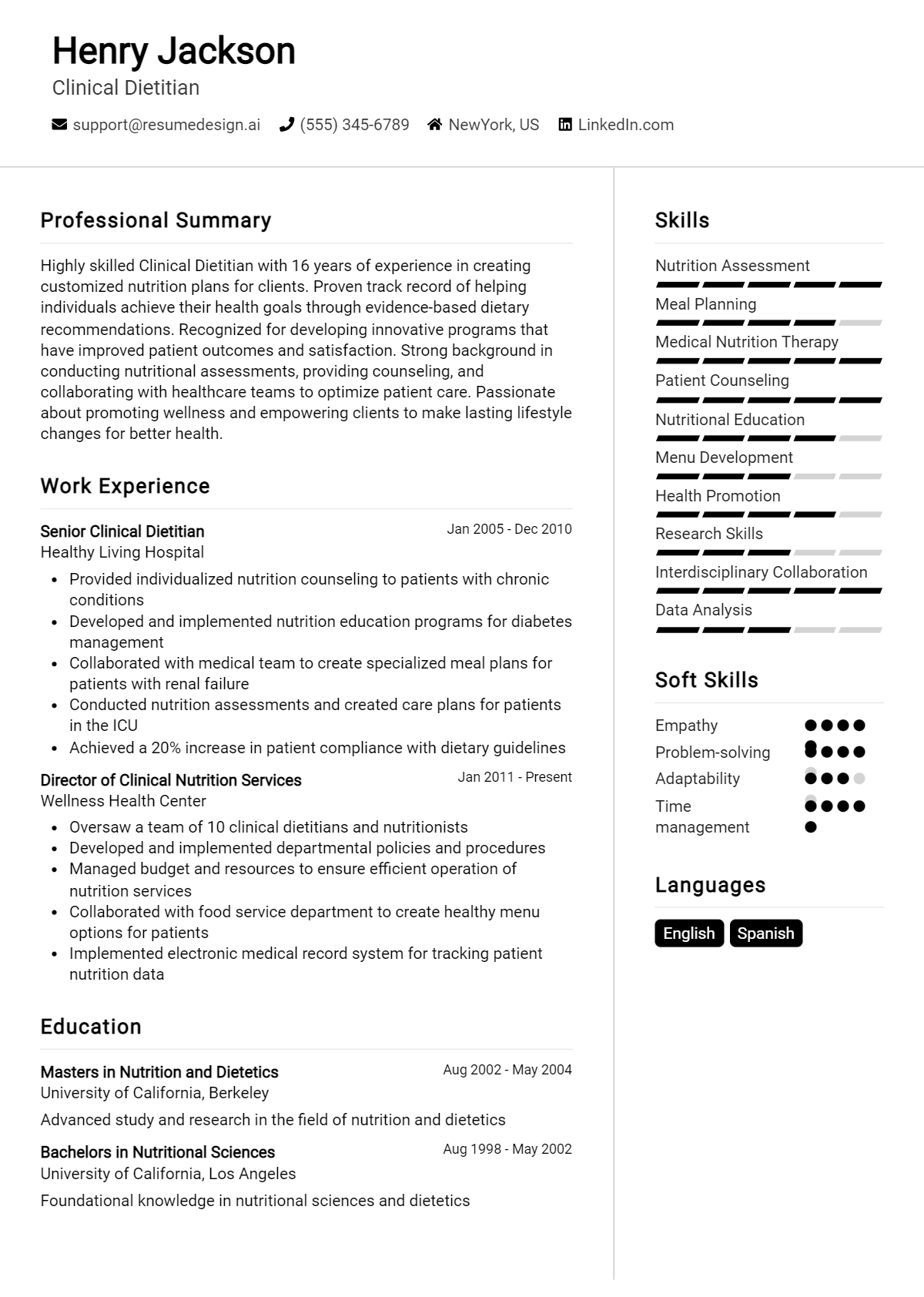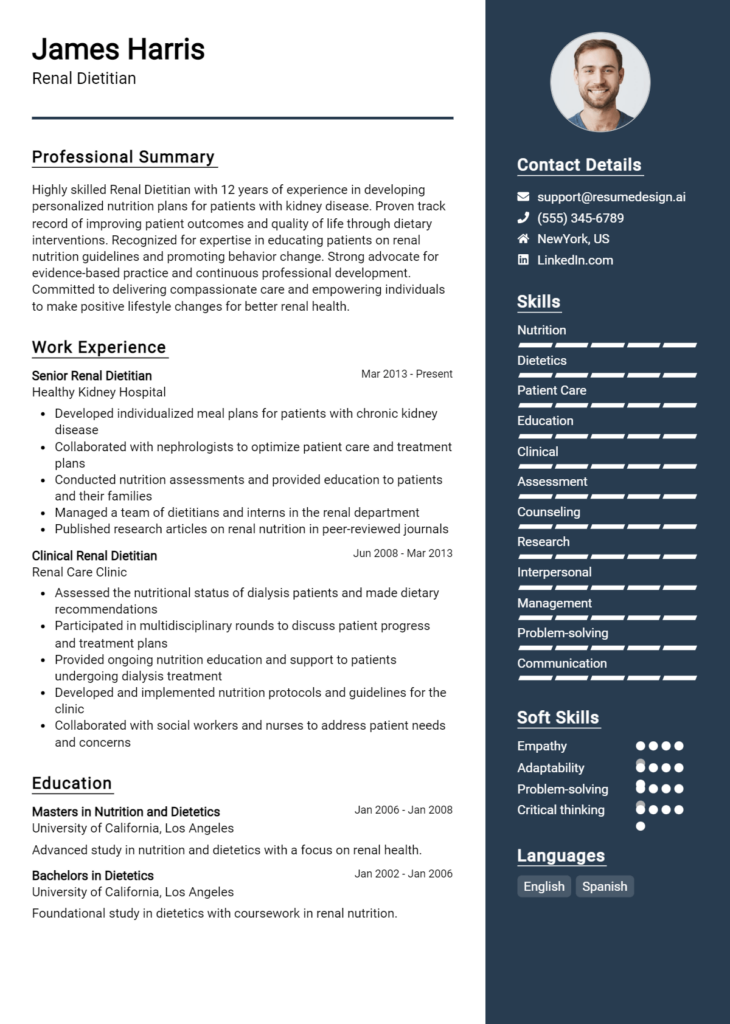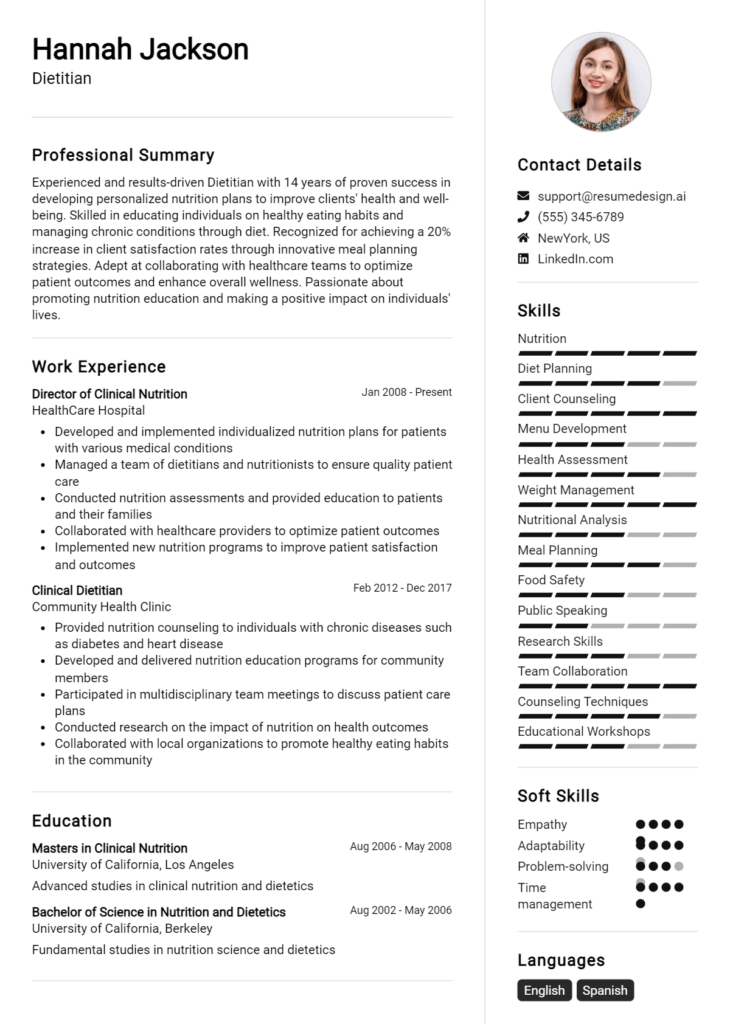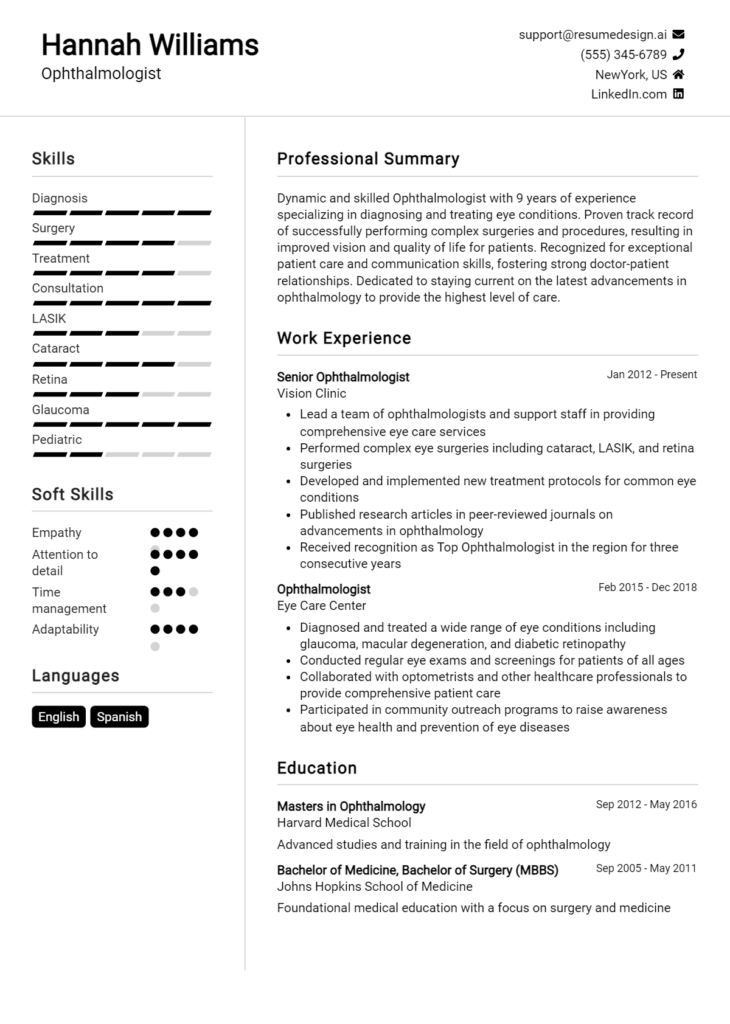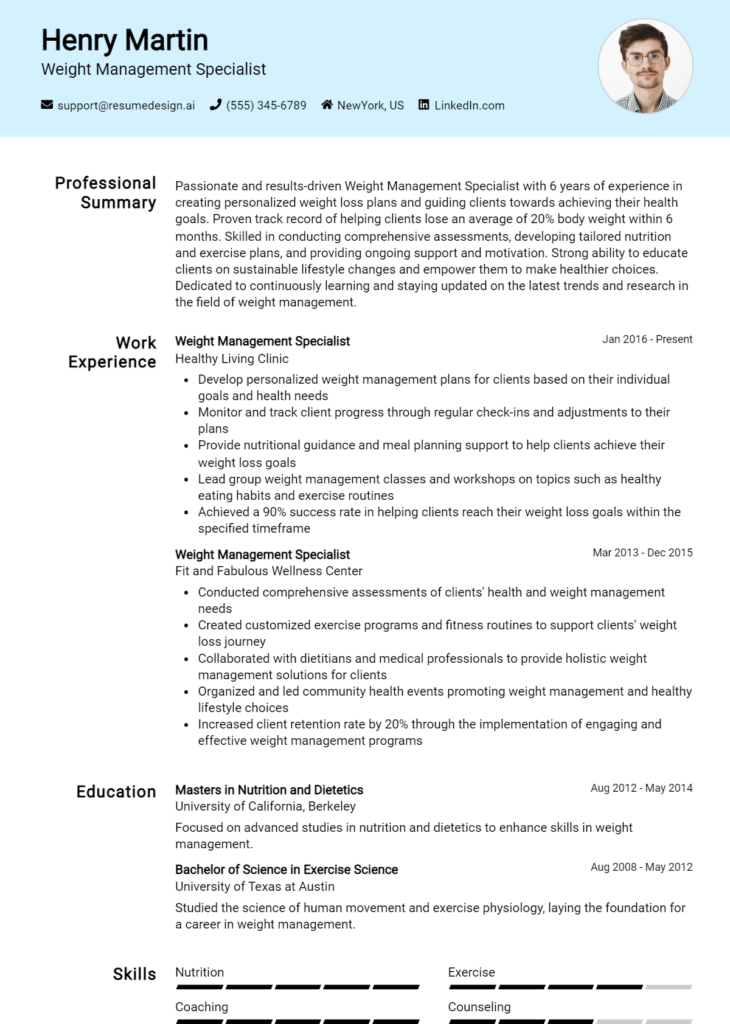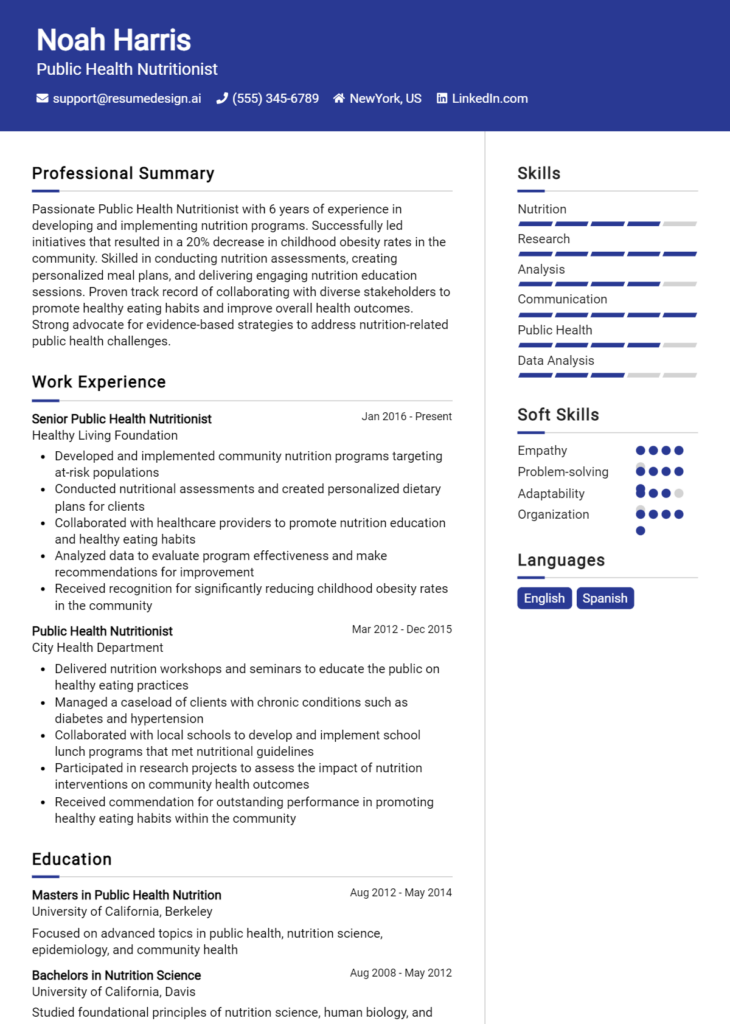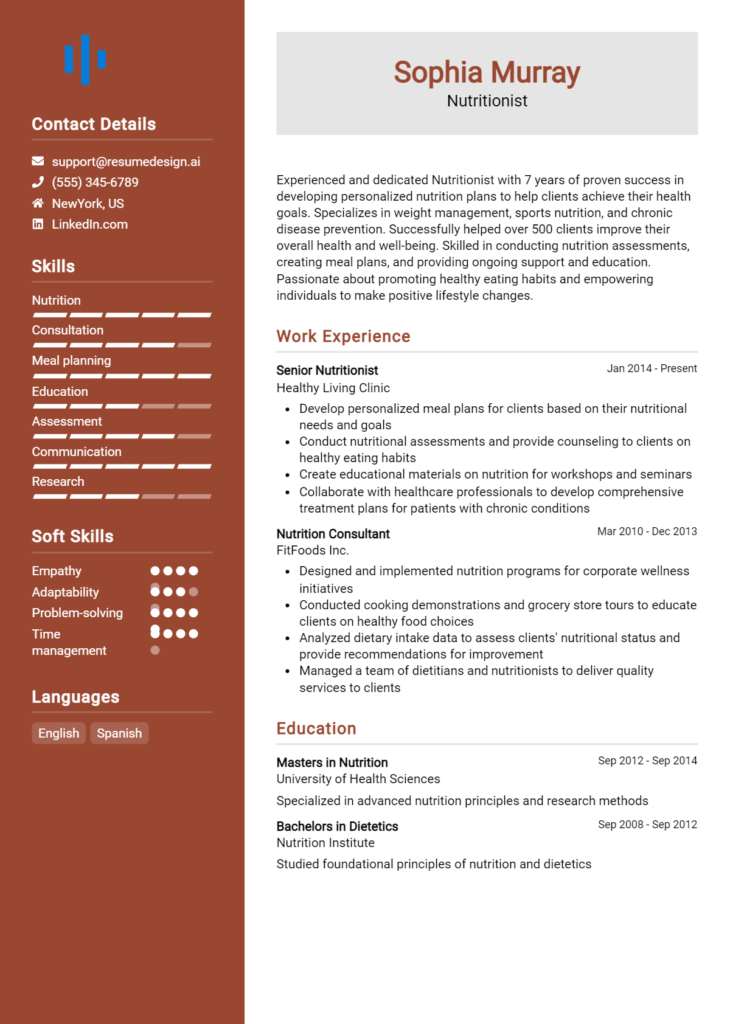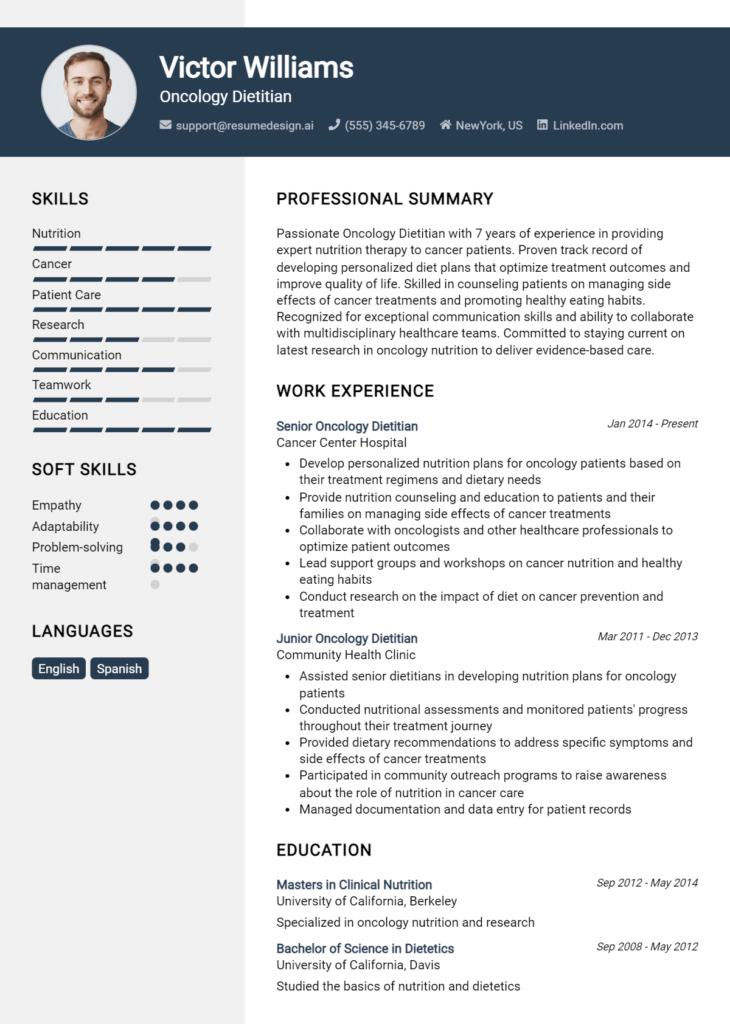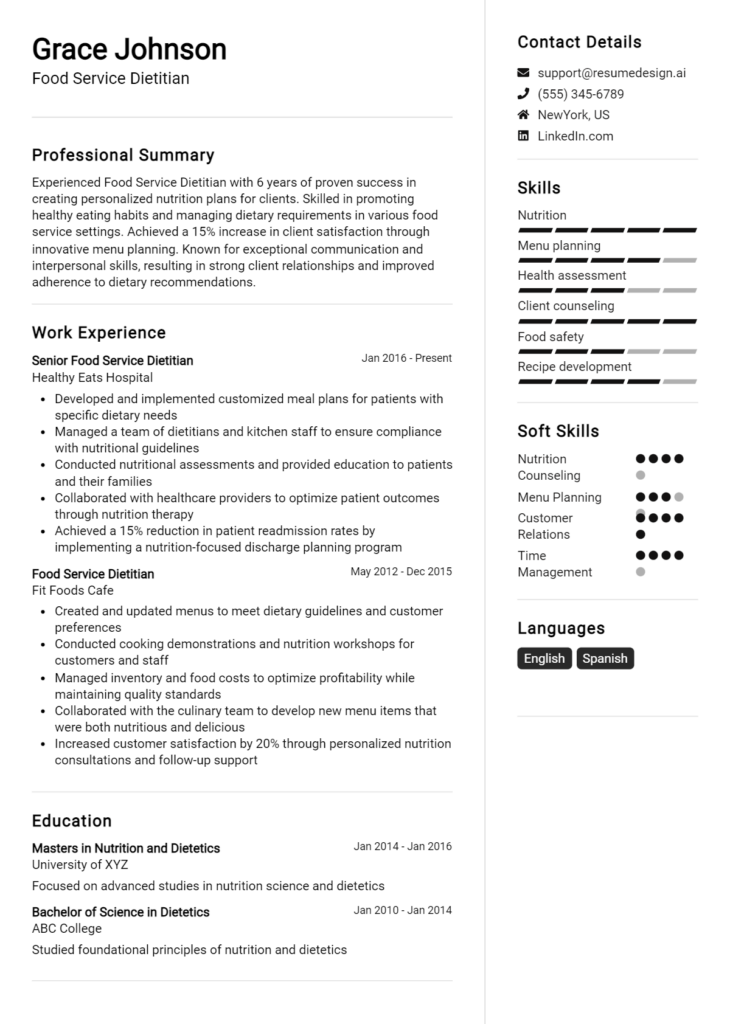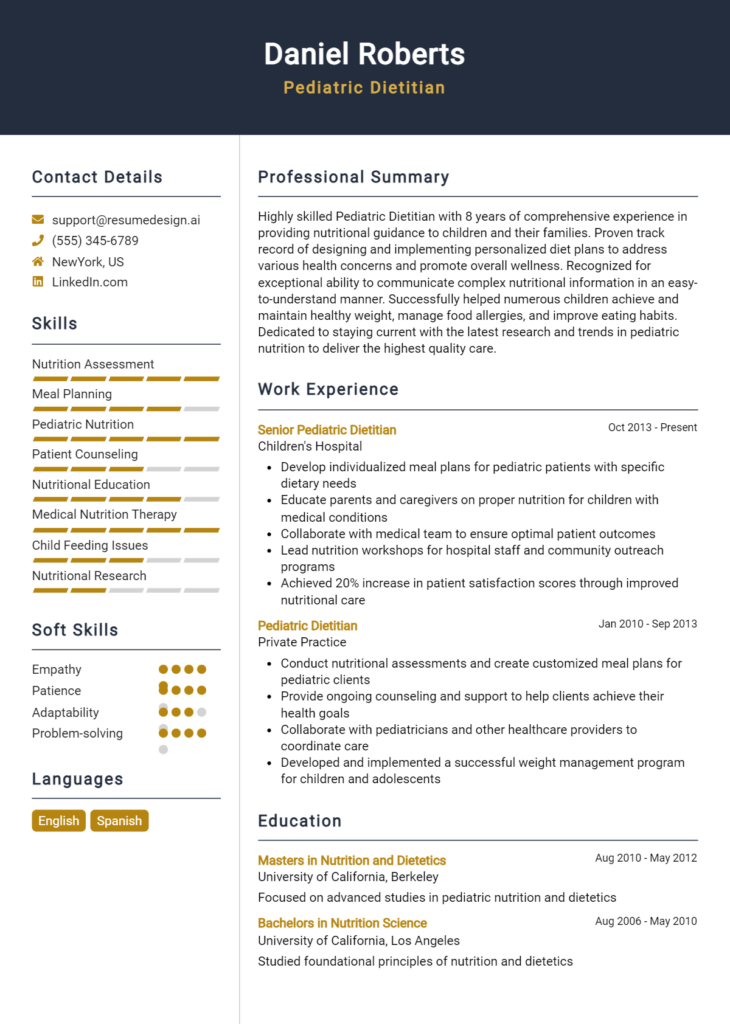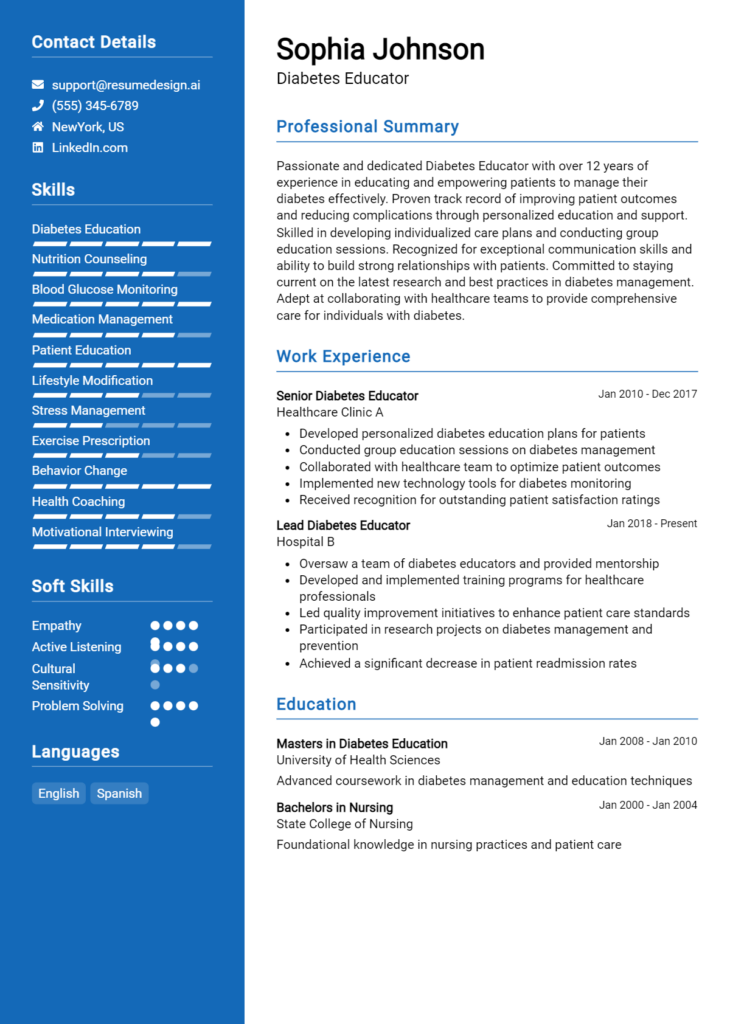Clinical Dietitian Core Responsibilities
A Clinical Dietitian plays a vital role in healthcare by assessing patients' nutritional needs and developing personalized meal plans to promote health and manage illnesses. This position requires strong technical knowledge of nutrition science, operational skills for implementing dietary programs, and problem-solving abilities to address diverse patient needs. By collaborating with medical staff, social workers, and patients, Clinical Dietitians help bridge departments to enhance patient outcomes. A well-structured resume highlighting these skills can effectively showcase a candidate's qualifications and commitment to the organization's goals.
Common Responsibilities Listed on Clinical Dietitian Resume
- Conducting comprehensive nutritional assessments of patients.
- Developing and implementing individualized dietary plans.
- Monitoring patient progress and adjusting nutrition plans as needed.
- Collaborating with healthcare teams to optimize patient care.
- Educating patients and families on nutritional practices and dietary changes.
- Conducting group nutrition education sessions.
- Maintaining accurate patient records and documentation.
- Staying updated on nutritional research and best practices.
- Participating in quality improvement initiatives.
- Advising on dietary restrictions and food allergies.
- Developing meal plans for specific health conditions.
- Coordinating with food service departments to ensure proper meal preparation.
High-Level Resume Tips for Clinical Dietitian Professionals
In the competitive field of clinical dietetics, a well-crafted resume serves as a vital tool for making a strong first impression on potential employers. It is often the first opportunity for candidates to showcase their unique blend of expertise, skills, and accomplishments in nutrition and dietetics. A resume that effectively reflects a Clinical Dietitian's qualifications can set a candidate apart from the competition and open the door to interviews and job offers. This guide will provide practical and actionable resume tips specifically tailored for Clinical Dietitian professionals to help them create a compelling narrative that resonates with hiring managers.
Top Resume Tips for Clinical Dietitian Professionals
- Tailor your resume to each specific job description, emphasizing the skills and experiences that align with the requirements of the position.
- Highlight relevant clinical experience, including internships and previous roles, to showcase your hands-on expertise in patient care.
- Quantify your achievements where possible, using metrics to demonstrate the impact of your interventions (e.g., percentage of patients who improved dietary adherence).
- Incorporate keywords from the job listing to optimize your resume for applicant tracking systems (ATS) that many employers use.
- Showcase industry-specific skills such as knowledge of dietary guidelines, nutrition assessment techniques, and counseling strategies.
- Include certifications and licenses relevant to the clinical dietitian role, such as Registered Dietitian Nutritionist (RDN) or Certified Dietitian Nutritionist (CDN).
- Utilize a clean, professional format with clear headings and bullet points to enhance readability and ensure key information stands out.
- Demonstrate continuous professional development by listing relevant workshops, seminars, and courses that enhance your knowledge and skills.
- Limit your resume to one or two pages, focusing on the most relevant information to keep the reader engaged.
By implementing these tips, Clinical Dietitian professionals can significantly enhance their resumes, increasing their chances of landing interviews and securing positions in this rewarding field. A well-structured resume that effectively communicates qualifications and achievements can make all the difference in a candidate's job search journey.
Why Resume Headlines & Titles are Important for Clinical Dietitian
In the competitive field of dietetics, a Clinical Dietitian's resume must stand out, and one of the most effective ways to achieve this is through a compelling resume headline or title. A strong headline serves as the first impression, capturing the attention of hiring managers and summarizing a candidate's key qualifications in a concise and impactful phrase. It should be relevant to the position being applied for, reflecting the candidate's expertise and aligning with the job description. By crafting a headline that succinctly conveys essential skills and experience, candidates can significantly enhance their chances of making a memorable first impression.
Best Practices for Crafting Resume Headlines for Clinical Dietitian
- Keep it concise—aim for one impactful phrase.
- Use industry-specific terminology to demonstrate expertise.
- Highlight your key qualifications and skills relevant to the clinical dietitian role.
- Incorporate quantifiable achievements if possible.
- Tailor the headline to match the job description.
- Avoid jargon or overly complex language that may confuse the reader.
- Focus on your unique value proposition—what sets you apart from other candidates.
- Make sure it aligns with the overall tone and content of your resume.
Example Resume Headlines for Clinical Dietitian
Strong Resume Headlines
Innovative Clinical Dietitian Specializing in Nutritional Therapy for Chronic Illness
Registered Dietitian Nutritionist with 5+ Years Experience in Pediatric Nutrition
Experienced Clinical Dietitian Committed to Evidence-Based Practice and Patient Education
Weak Resume Headlines
Dietitian Looking for a Job
Nutrition Expert
Strong headlines are effective because they convey specific expertise and accomplishments, immediately signaling to hiring managers that the candidate possesses the relevant skills needed for the role. They are tailored, engaging, and provide a clear snapshot of the candidate’s strengths. In contrast, weak headlines fail to impress due to their vagueness and lack of relevance, making it difficult for employers to gauge the candidate's qualifications and suitability for the position. A generic title does not capture the unique contributions a candidate can make, ultimately diminishing the impact of their resume.
Writing an Exceptional Clinical Dietitian Resume Summary
A resume summary is a crucial component for Clinical Dietitians, serving as a compelling introduction that succinctly encapsulates a candidate's skills, experience, and accomplishments. A well-crafted summary can quickly capture the attention of hiring managers, offering them a snapshot of what the candidate brings to the table and how they can contribute to the organization. In a competitive job market, it is vital for the summary to be concise yet impactful, tailored to align with the specific job description to enhance the chances of securing an interview.
Best Practices for Writing a Clinical Dietitian Resume Summary
- Quantify achievements to showcase your impact, such as the number of patients managed or improvements in patient health outcomes.
- Highlight specific skills relevant to the clinical dietitian role, such as nutritional assessment, patient counseling, and dietary planning.
- Tailor the summary to the job description, incorporating keywords that align with the employer's needs.
- Keep it concise, ideally 2-4 sentences, to ensure it’s easily digestible for hiring managers.
- Focus on accomplishments rather than just responsibilities to demonstrate your contributions in previous roles.
- Use action-oriented language to convey confidence and proactivity in your approach to dietetics.
- Incorporate soft skills such as empathy and communication, which are essential in patient care.
- Proofread for clarity and professionalism, ensuring there are no grammatical errors or typos.
Example Clinical Dietitian Resume Summaries
Strong Resume Summaries
Dynamic Clinical Dietitian with over 5 years of experience in developing personalized nutrition plans that have improved patient outcomes by 30%. Expertise in managing a diverse patient population and collaborating with healthcare teams to promote optimal health.
Results-driven Clinical Dietitian skilled in dietary counseling and nutritional education, having successfully implemented a new dietary program that reduced hospital readmissions by 15% in one year. Proven ability to engage patients and motivate lifestyle changes.
Compassionate Clinical Dietitian with extensive experience in community health initiatives, having served over 1,000 patients. Proficient in conducting nutritional assessments and developing interventions that led to a 25% improvement in patients' compliance with dietary guidelines.
Weak Resume Summaries
Dedicated Clinical Dietitian with experience in various settings looking for a new opportunity. Good with patients and knowledgeable about nutrition.
Clinical Dietitian seeking a position to utilize my skills in nutrition and dietetics. I have worked in several facilities and am eager to help patients improve their health.
The examples of strong resume summaries are characterized by their specificity and quantifiable results, demonstrating a clear impact on patient care and organizational goals. They effectively highlight relevant skills and experiences tailored to the Clinical Dietitian role. In contrast, the weak summaries lack detail and measurable achievements, making them appear generic and less engaging to potential employers.
Work Experience Section for Clinical Dietitian Resume
The work experience section of a Clinical Dietitian resume is critical as it provides a comprehensive overview of the candidate's professional journey, highlighting their technical skills and ability to effectively manage teams while delivering high-quality nutrition products and services. This section allows candidates to showcase not only their expertise in clinical nutrition but also their capacity to drive results through collaboration and strategic initiatives. Quantifying achievements—such as improved patient outcomes or increased efficiency—is essential in making a strong impression, and aligning experiences with industry standards ensures that candidates demonstrate their value to potential employers.
Best Practices for Clinical Dietitian Work Experience
- Detail specific technical skills related to dietetics and clinical nutrition.
- Quantify achievements with numbers, percentages, or metrics to illustrate impact.
- Highlight collaborative projects, emphasizing teamwork and leadership roles.
- Align experiences with current industry standards and best practices.
- Use action verbs to convey a sense of initiative and proactivity.
- Include diverse experiences, such as internships, volunteer work, or research projects.
- Tailor descriptions to reflect the specific requirements of the job being applied for.
- Maintain clarity and conciseness while providing enough detail to convey expertise.
Example Work Experiences for Clinical Dietitian
Strong Experiences
- Developed and implemented a nutrition program that improved patient compliance by 30%, leading to enhanced health outcomes in a clinical setting.
- Conducted over 50 individual dietary assessments, resulting in a 25% increase in positive feedback from clients regarding their nutritional plans.
- Led a multidisciplinary team to redesign hospital menus, achieving a 15% reduction in food waste while meeting all dietary needs of patients.
- Collaborated with healthcare professionals to create educational resources that increased patient understanding of dietary restrictions by 40%.
Weak Experiences
- Worked with patients to provide dietary advice.
- Assisted in managing a nutrition program.
- Participated in team meetings to discuss nutrition-related issues.
- Helped with food preparation and serving in a hospital.
The examples provided illustrate the difference between strong and weak experiences based on their clarity and impact. Strong experiences are characterized by specific, quantifiable outcomes and demonstrate leadership and collaboration, making them more compelling to potential employers. In contrast, weak experiences lack detail and fail to showcase the candidate's contributions, making it difficult to assess their skills and achievements in the field of clinical dietetics.
Education and Certifications Section for Clinical Dietitian Resume
The education and certifications section of a Clinical Dietitian resume plays a crucial role in showcasing the candidate's academic achievements, specialized training, and commitment to ongoing professional development. This section not only highlights the foundational knowledge acquired through formal education but also emphasizes industry-relevant certifications that validate the candidate's expertise. By including relevant coursework and specialized training, candidates can significantly enhance their credibility and demonstrate their alignment with the specific demands of the job role, reassuring employers of their qualifications and readiness to contribute effectively in a clinical setting.
Best Practices for Clinical Dietitian Education and Certifications
- Prioritize relevant degrees in nutrition, dietetics, or related fields.
- Include industry-recognized certifications such as Registered Dietitian Nutritionist (RDN) or Certified Nutrition Support Clinician (CNSC).
- Highlight continuing education courses that enhance skills, such as diabetes management or pediatric nutrition.
- Provide details of any specialized training that aligns with the job description, like sports nutrition or weight management.
- List any honors or distinctions received during academic programs to showcase excellence.
- Be specific about the institutions attended and the dates of graduation to convey credibility.
- Regularly update this section with new certifications or courses to reflect continuous professional development.
- Avoid including irrelevant qualifications that do not pertain to dietetics or clinical practice.
Example Education and Certifications for Clinical Dietitian
Strong Examples
- Bachelor of Science in Dietetics, University of Nutrition, Graduated May 2022
- Registered Dietitian Nutritionist (RDN), Commission on Dietetic Registration, 2023
- Certified Diabetes Educator (CDE), 2023
- Completed coursework in Medical Nutrition Therapy and Nutritional Biochemistry
Weak Examples
- Associate Degree in General Studies, Community College, Graduated 2018
- Certification in Food Handling, 2020
- Completed a workshop in Basic Cooking Skills, 2019
- High School Diploma, Graduated 2016
The strong examples are considered effective because they directly align with the qualifications expected of a Clinical Dietitian, emphasizing relevant degrees and recognized certifications that demonstrate the candidate's preparedness for the role. In contrast, the weak examples illustrate qualifications that are either outdated or not relevant to the field of dietetics, which do not contribute to the candidate's credibility or suitability for clinical positions.
Top Skills & Keywords for Clinical Dietitian Resume
A well-crafted resume is vital for a Clinical Dietitian, as it showcases not only educational qualifications but also the essential skills that set candidates apart in a competitive job market. Skills highlight a dietitian's ability to assess, plan, and implement nutritional care for patients, making them crucial for demonstrating competency in this specialized field. By emphasizing both hard and soft skills, candidates can convey their expertise and interpersonal abilities, which are essential for effective patient management and collaboration with healthcare teams.
Top Hard & Soft Skills for Clinical Dietitian
Hard Skills
- Medical Nutrition Therapy
- Nutritional Assessment
- Diet Planning
- Food Safety Regulations
- Nutritional Biochemistry
- Research and Analysis
- Clinical Documentation
- Weight Management Techniques
- Diabetes Education
- Knowledge of Dietary Supplements
- Community Nutrition Programs
- Food Service Management
- Patient Education Techniques
- Nutritional Software Proficiency
- Special Diets (e.g., for allergies, intolerances)
- Evidence-Based Practice
- Food Labeling and Analysis
Soft Skills
- Empathy and Compassion
- Communication Skills
- Team Collaboration
- Problem-Solving Abilities
- Time Management
- Critical Thinking
- Adaptability
- Patient Advocacy
- Motivational Skills
- Cultural Sensitivity
- Interpersonal Skills
- Active Listening
- Conflict Resolution
- Attention to Detail
- Organizational Skills
- Professionalism
- Coaching and Mentoring
By integrating these skills into your resume, along with relevant work experience, you can effectively present yourself as a qualified candidate ready to make a significant impact in the field of clinical nutrition.
Stand Out with a Winning Clinical Dietitian Cover Letter
Dear [Hiring Manager's Name],
I am writing to express my interest in the Clinical Dietitian position at [Hospital/Clinic Name], as advertised on [Job Board/Company Website]. With a Master’s degree in Nutrition and Dietetics, coupled with over [X years] of clinical experience in diverse healthcare settings, I am excited about the opportunity to contribute to your team. My background has equipped me with a comprehensive understanding of nutritional science, patient care, and the ability to develop tailored dietary plans that improve patient outcomes.
In my previous role at [Previous Employment/Organization Name], I successfully collaborated with multidisciplinary teams to assess and implement nutritional interventions for patients with a range of conditions, including diabetes, cardiovascular diseases, and obesity. I pride myself on my ability to communicate effectively with both patients and healthcare professionals, ensuring that dietary recommendations are clear, actionable, and culturally sensitive. My commitment to continuous learning has also led me to stay updated on the latest research and trends in nutrition, enabling me to provide evidence-based guidance to my patients.
I am particularly impressed by [Hospital/Clinic Name]’s commitment to holistic patient care and community health initiatives. I am eager to bring my expertise in clinical nutrition and my passion for helping individuals achieve their health goals to your esteemed organization. I believe that my proactive approach and patient-centered philosophy align well with your team's mission to foster healthier communities.
Thank you for considering my application. I look forward to the opportunity to discuss how I can contribute to the exceptional care provided at [Hospital/Clinic Name]. Please feel free to contact me at [Your Phone Number] or [Your Email] to schedule a conversation.
Sincerely,
[Your Name]
[Your LinkedIn Profile or Other Relevant Links]
Common Mistakes to Avoid in a Clinical Dietitian Resume
Crafting an effective resume as a Clinical Dietitian requires careful attention to detail, as it serves as your first impression on potential employers. Many candidates make common mistakes that can hinder their chances of landing an interview. Understanding these pitfalls can help you create a polished and professional resume that showcases your qualifications and experience. Here are some common mistakes to avoid:
Generic Objective Statements: Avoid using a one-size-fits-all objective statement. Tailor it to reflect your specific goals and how they align with the job you are applying for.
Ignoring Keywords: Failing to include relevant keywords from the job description can result in your resume being overlooked by applicant tracking systems (ATS). Make sure to incorporate specific terms related to clinical dietetics.
Lack of Quantifiable Achievements: Instead of merely listing responsibilities, highlight your achievements with quantifiable results, such as the percentage of patients who met their nutritional goals under your guidance.
Poor Formatting: A cluttered or inconsistent format can make your resume difficult to read. Use clear headings, bullet points, and consistent font styles to enhance readability.
Overly Long Descriptions: Be concise in your descriptions. Long-winded explanations can detract from your main qualifications. Aim for clarity and brevity, focusing on key points.
Failing to Highlight Certifications: Certifications such as Registered Dietitian Nutritionist (RDN) or Board Certified Specialist in Sports Dietetics (CSSD) are crucial. Ensure these are prominently displayed.
Neglecting Continuing Education: Clinical dietetics is an evolving field. Failing to mention recent courses, workshops, or conferences can make your resume appear outdated. Highlight your commitment to ongoing professional development.
Omitting Soft Skills: While technical skills are essential, soft skills like communication and empathy are equally important in clinical settings. Be sure to include these qualities in your resume to demonstrate your holistic capabilities.
Conclusion
As a Clinical Dietitian, your role is crucial in promoting health and wellness through nutrition. Throughout this article, we’ve explored the essential skills and qualifications needed for success in this field, including a strong understanding of dietary science, excellent communication skills, and the ability to work collaboratively with healthcare teams. We also discussed the importance of staying updated with the latest nutritional research and guidelines to provide the best care for patients.
In conclusion, if you are seeking to enhance your career as a Clinical Dietitian, reviewing and refining your resume is an essential step. A well-crafted resume can effectively showcase your skills, experience, and qualifications to potential employers. To assist you in this process, consider utilizing various resources available, such as resume templates, which can provide a professional layout, and a resume builder that simplifies the creation of a tailored resume.
Additionally, you can explore resume examples to gather inspiration and see how others in your field present their qualifications. Don't forget the importance of a compelling cover letter; check out the cover letter templates available to help you make a strong first impression.
Take action today by reviewing your Clinical Dietitian resume and enhancing your chances of landing your next opportunity!

